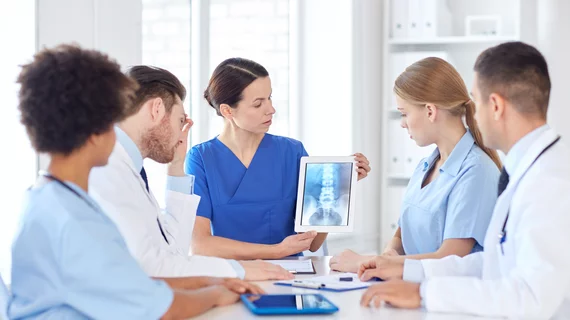Adverse reactions to contrast media can be life-threating and require immediate action from radiologists, wrote authors of a recent American Journal of Roentgenology study. A simulation-based program improved radiologists’ knowledge and comfort levels dealing with such a situation.
“Multiple studies have found that radiologists’ knowledge regarding management of contrast media reactions is deficient,” wrote lead author Saad Ali, MD, of the University of Chicago Medical Center in Chicago, and colleagues.
The team created 15 adverse contrast media reaction scenarios which ran on high-fidelity adult and pediatric mannequins in a simulation center. A total of 96 radiology trainees participated in the program, which included two didactic lectures and one simulation session. Participants completed a questionnaire to assess knowledge and comfort before and after the program.
After completing the program, mean scores increased from 69 percent to 82 percent. Three participants saw their scores drop, but “notably,” the authors wrote, those specific trainees had high scores on the pre-simulation test. Using a five-point Likert scale (1, not comfortable; 5, very comfortable) mean scores increased from 3.1 to 4.5. A survey which assessed the overall program revealed scores ranging from 4.5 to 4.7.
“Conventional training with didactic lectures often lacks the practical reinforcement necessary to maintain the pertinent knowledge, technical skills, and procedural fluency required to manage serious adverse reactions to contrast media,” the authors wrote. “We describe the development of a high-fidelity simulation program with a larger variety of scenarios than in prior studies that can provide radiologists the knowledge and skills needed to recognize and manage adverse contrast media reactions."
Additionally, Ali et al. noted prior studies have showed simulation to be more cost-effective than didactic lectures when taking into account the costs associated with adverse contrast reactions. In the future, the team will test if students can retain the knowledge and skills over a long period of time and how training impacts clinical outcomes.

